Books
Smart Climate Action Through Transfer of Development Rights
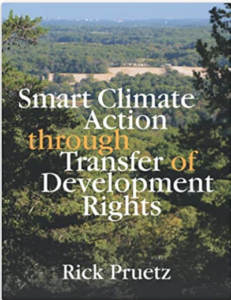 By Rick Pruetz, VP, Ecocity Builders
By Rick Pruetz, VP, Ecocity Builders
Land use is essential to climate action. We need diverse, compact communities where people can meet their daily needs without a car. We need to preserve our farms, forests, and wetlands, as well as maximize their ability to sequester carbon. We need to secure the embedded energy in older buildings, safeguard our water, restore biodiversity, and adapt to the growing threat from wildfires, floods, and sea level rise. By accomplishing any one of these goals, we often receive many other benefits in addition to the mitigation of greenhouse gases and adaptation to the growing threats of climate change.
Transfer of development rights, or TDR, is a cost-effective way of steering growth away from places needed for climate action and into locations where development can be safely and efficiently accommodated. Unlike other preservation tools, TDR is primarily powered by private sector profits rather than taxation. In addition, jurisdictions themselves can engage in the TDR process to transform a limited investment into a perpetual revolving fund for preservation.
Smart Climate Action profiles 282 TDR programs and highlights how this market-based tool can and has been used to preserve greenbelts, forests, farms, wetlands, and landmarks as well as reduce vulnerability to wildfire, floods, sea level rise, and water scarcity. Developing a successful TDR program requires extensive community engagement and political will. However, the cost of using TDR for climate action remains much lower than the cost of inaction.
Rick Pruetz is a former city planner and planning consultant who continues to write about sustainability in general and TDR in particular. He has authored six books including Lasting Value: Open Space Planning and Preservation Successes and Ecocity Snapshots: Learning from Europe’s Greenest Places.
Order Smart Climate Action Through Transfer of Development Rights from Amazon
World Rescue – An Economics Built on What We Build
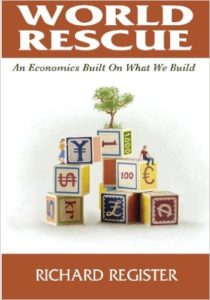 By Richard Register
By Richard Register
Climate change? Biodiversity collapse? Failed states proliferating? Design yourself! Build our future! Richard Register’s new book takes off and goes right to the physical foundations of society, built on biology, built on planet Earth, bathed in the sun’s life-giving glare. Nature’s economics is the foundation for human economics, he says, and survival and thriving hangs in the balance.
Order BookThe Ecocity Coloring Book
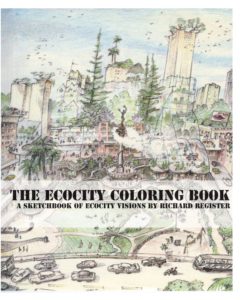 A Sketchbook of Ecocity Visions by Richard Register
A Sketchbook of Ecocity Visions by Richard Register
Richard Register is as much an artist as he is a writer and activist. The Ecocity Coloring Book includes dozens of imaginative depictions of his ecological urban philosophies and visions. Add your ecocity embellishments to his ideas!
Order BookEcoCities: Rebuilding Cities in Balance with Nature
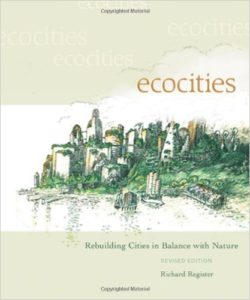 By Richard Register
By Richard Register
Ecocities is about re-building cities and towns based on ecological principles for the long term sustainability, cultural vitality and health of the Earth’s biosphere. Unique in the literature is the book’s insight that the form of the city really matters – and that it is within our ability to change it, and crucial that we do.
Order Book
Ecocity Berkeley
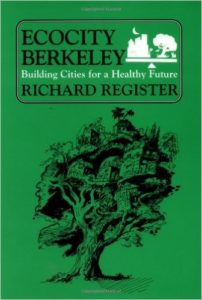 By Richard Register
By Richard Register
Ecocity Berkeley offers innovative city planning solutions that would work anywhere, but the book offers a vision of what the future can be like with a fair amount of planning beforehand. This inspirational book is meant for anyone interested in environmental activism, and anyone looking to advocate for similar planning improvements in their city.
Order BookVillage Wisdom: Future Cities
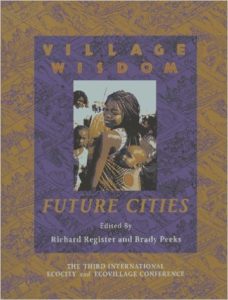 Edited by Richard Register and Brady Peaks
Edited by Richard Register and Brady Peaks
Village Wisdom is an incredible presentation of real-world solutions for population and environmental issues now faced all over the world, summarizing information presented at ECOCITY 3. It includes examples of design, planning, appropriate technology, and social and environmental activism in contemporary Africa and around the world.
Order BookSustainable Cities: Governing for Urban Innovation
 By Simon Joss
By Simon Joss
In an era where entirely new eco-cities are being built and established ones being retro-fitted in response to environmental pressures, this text looks at the varying successes of the urban sustainability movement and its relationship to the planners, policy-makers and citizens who are inseparable from it. In this wide-ranging text, Simon Joss examines mainstream policy and practice and looks at the approaches that can overcome some of their drawbacks.
Order BookTomorrow’s City Today: Prospects for Standardising Sustainable Urban Development
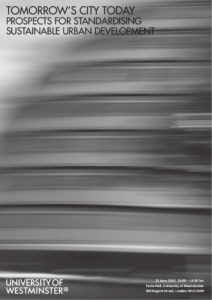 Simon Joss, Robert Cowley, Martin de Jong, Bernhard Muller, Buhm Soon Park, William Rees, Mark Roseland, Dr. Yvonne Rydin
Simon Joss, Robert Cowley, Martin de Jong, Bernhard Muller, Buhm Soon Park, William Rees, Mark Roseland, Dr. Yvonne Rydin
This research report provides a conceptual and empirical overview of the emerging field of eco-city frameworks. It conceptualises the rise of indicators, standards and frameworks for sustainable urban development from the twin perspective of innovation and governance. The empirical research encompasses over 40 frameworks used globally.
Free DownloadEcopolis: Architecture and Cities for a Changing Climate
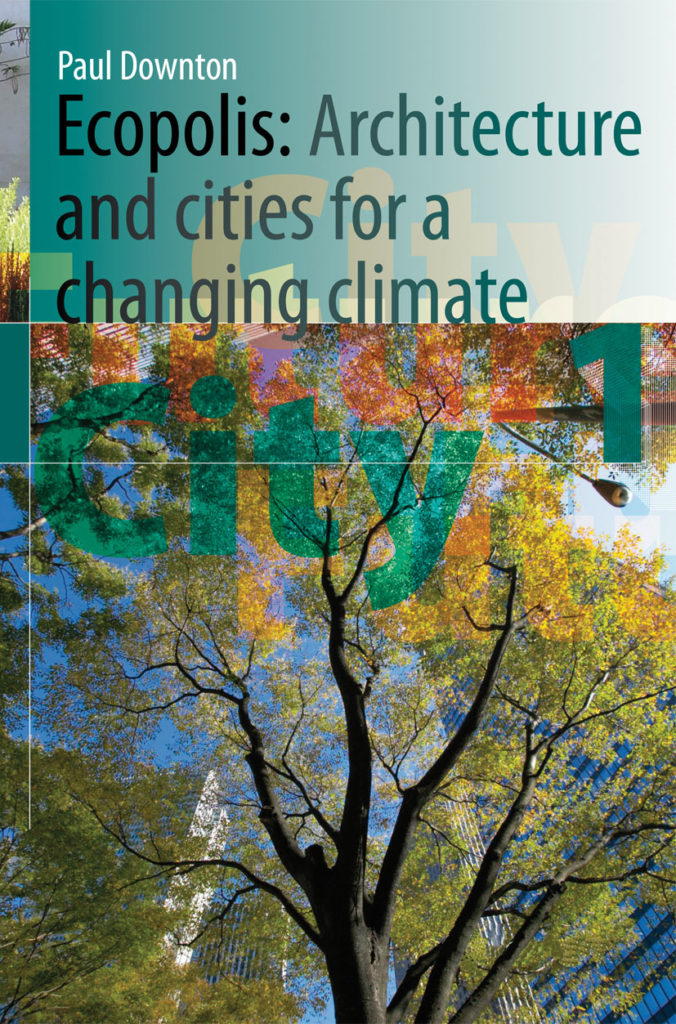 By Paul F. Downton
By Paul F. Downton
From 2008, for the first time in human history, half of the world’s population now live in cities. Yet despite a wealth of literature on green architecture and planning, there is to date no single book which draws together theory from the full range of disciplines – from architecture, planning and ecology – which we must come to grips with if we are to design future cities which are genuinely sustainable. Paul Downton’s Ecopolis takes a major step along this path.
Order BookEcocity Snapshots: Learning from Europe’s Greenest Places
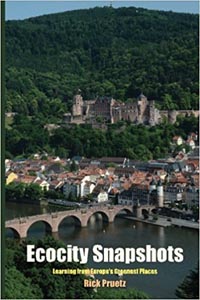 By Rick Pruetz
By Rick Pruetz
Europe’s greenest places offer hope for a positive outcome. The 19 cities profiled in this book are reintroducing greenways and stream corridors into the urban landscape, often in ways that assist with floodwater management and biodiversity while reconnecting people with their environment. These cities are building compact, diverse neighborhoods that can easily be navigated on foot or by bicycle and public transportation. They are turning brownfields into ecodistricts that expand the limits of closed-loop energy, waste and water systems. They are cutting the greenhouse gas emissions that cause climate change and pursuing a carbon-free future by fueling district heating and power systems using wind, water, geothermal, biomass and other innovative technologies.
Order BookThe TDR Handbook: Designing and Implementing Transfer of Development Rights Programs
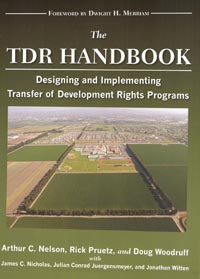 By Rick Pruetz
By Rick Pruetz
The TDR Handbook provides a comprehensive guide to every aspect of TDR programs, from the thinking behind them to the nuts and bolts of implementation-including statutory guidance, model ordinances, suggestions for program administration, and comparisons with other types of preservation programs. In addition, six of its twenty chapters are devoted to case studies of all major uses to which TDR programs have been utilized to date, including recent urban revitalization projects that utilize TDR principles.
Order BookDynamics and Resilience of Informal Areas: International Perspectives
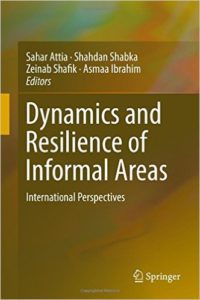 Edited by Sahar Attia, Shahdan Shabka, Zeinab Shafik, & Asmaa Abdel Aty Mohamed Ibrahim
Edited by Sahar Attia, Shahdan Shabka, Zeinab Shafik, & Asmaa Abdel Aty Mohamed Ibrahim
This volume provides visionary approaches within the multi-disciplines engaged with informal settlements covering three main themes; ‘Innovative Policies and Strategies to Informal Urbanism’; ‘Production, Operation and the Life-World of Urban Space’ and finally ‘The Dynamics of Informal Settlements’.
Order BookOur Ecological Footprint – Reducing Human Impact on the Earth
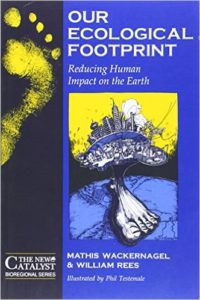 By Mathis Wackernagel & William Rees
By Mathis Wackernagel & William Rees
Our Ecological Footprint presents an internationally-acclaimed tool for measuring and visualizing the resources required to sustain our households, communities, regions and nations, converting the seemingly complex concepts of carrying capacity, resource-use, waste-disposal and the like into a graphic form that everyone can grasp and use.
Order BookResilience in Ecology and Urban Design: Linking Theory and Practice for Sustainable Cities
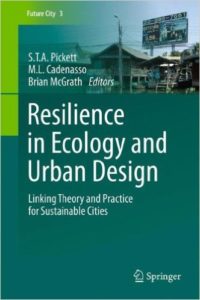 Edited by S.T.A. Pickett, M.L. Cadenasso, Brian McGrath
Edited by S.T.A. Pickett, M.L. Cadenasso, Brian McGrath
The contributors to this volume propose strategies of urgent and vital importance that aim to make today’s urban environments more resilient. Resilience, the ability of complex systems to adapt to changing conditions, is a key frontier in ecological research and is especially relevant in creative urban design, as urban areas exemplify complex systems.
Order Book By Rick Pruetz, VP, Ecocity Builders
By Rick Pruetz, VP, Ecocity Builders

